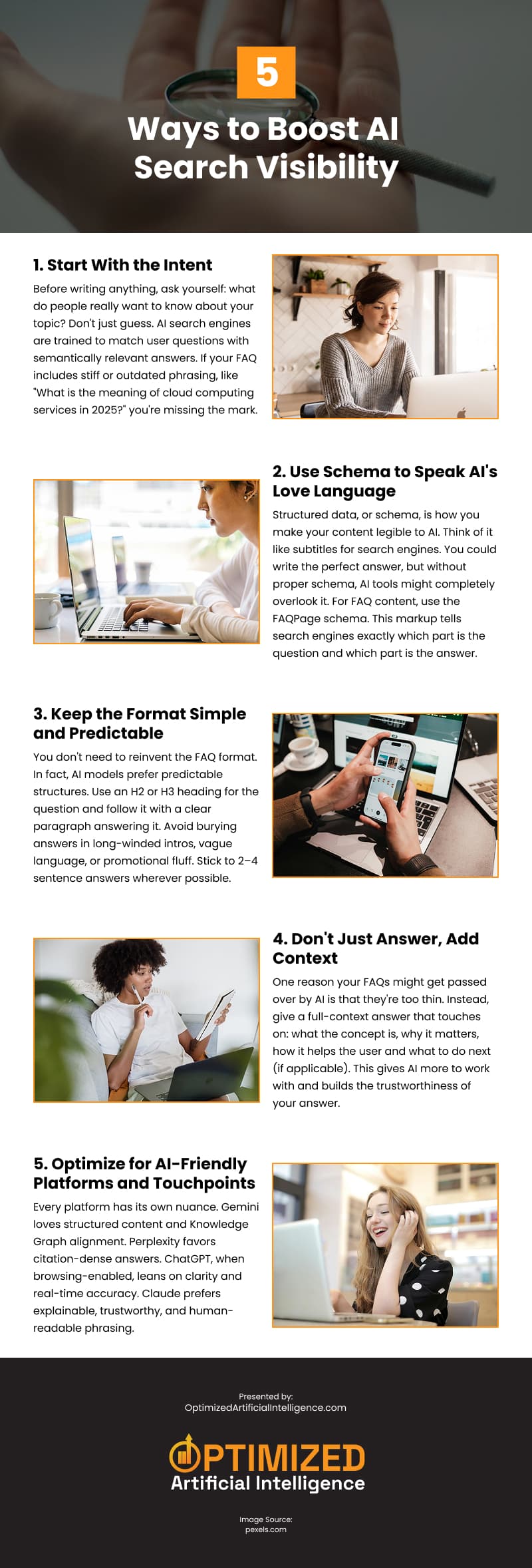You’re probably used to thinking about search engines in terms of keywords, rankings, and those familiar blue links. But AI-powered tools like ChatGPT, Gemini, and Perplexity work differently. They don’t just crawl for keywords. They interpret intent, pull insights from multiple sources, and deliver answers in a natural, conversational way.
That’s where your FAQ or Q&A content becomes incredibly valuable. When structured the right way, it’s not just helpful. It becomes a powerful way to get cited, summarized, and surfaced by large language models (LLMs).
To show up in AI-driven results, your FAQs need to speak the language of AI: clarity, consistency, and proper structure. Think of it as optimizing for understanding, not just ranking.

(rawpixel.com/Freepik)
Why FAQs Are Prime Real Estate in AI Search
LLMs prioritize content that clearly connects a question with a direct, well-contextualized answer. The more clearly you format and mark up your FAQs, the more likely these AI engines are to:
-
- Recognize your content as authoritative
- Pull your answers into their generated responses
- Credit or cite your brand as a trusted source
- Surface your content in response to voice or AI-driven queries
This is why structuring Q&A content correctly isn’t just good UX. It’s essential search engine optimization for AI platforms.
1. Start With the Intent
What Questions Are Users Actually Asking?
Before writing anything, ask yourself: what do people really want to know about your topic? Don’t just guess. Use tools like AnswerThePublic, Google’s “People Also Ask,” or Perplexity’s follow-up suggestions to uncover the exact language real users are using.
AI search engines are trained to match user questions with semantically relevant answers. If your FAQ includes stiff or outdated phrasing, like “What is the meaning of cloud computing services in 2025?” you’re missing the mark. Write the way your audience actually talks.
Instead, use natural, concise question structures like:
-
- “How does cloud computing work?”
- “What are the benefits of AI search optimization?”
- “Why is schema markup important for SEO?”
These match more closely with conversational AI queries and improve your chances of selection.
2. Use Schema to Speak AI’s Love Language
Structured data, or schema, is how you make your content legible to AI. Think of it like subtitles for search engines. You could write the perfect answer, but without proper schema, AI tools might completely overlook it.
For FAQ content, use the FAQPage schema. This markup tells search engines exactly which part is the question and which part is the answer. More importantly, it signals that your content is designed to serve as a clear, standalone response, which is exactly what AI search engines are looking for.
Here’s the love language analogy: schema is like bringing flowers, speaking their dialect, and giving clear directions all at once. It tells the AI:
-
- “Hey, here’s a direct question.”
- “Here’s a clean, complete answer.”
- “Here’s proof you can trust me.”
When implemented correctly, this makes your site eligible for inclusion in AI tools like ChatGPT’s browsing answers, Gemini’s AI Overviews, Microsoft Copilot’s summaries, Claude’s contextual outputs, and Perplexity’s citation boxes. This is a core component of AI overviews search optimization: structuring your content so it’s easily surfaced, summarized, and cited by the AI engines powering modern search.
3. Keep the Format Simple and Predictable
You don’t need to reinvent the FAQ format. In fact, AI models prefer predictable structures. Use an H2 or H3 heading for the question and follow it with a clear paragraph answering it. Avoid burying answers in long-winded intros, vague language, or promotional fluff.
Here’s an effective structure:
-
- Q: What is structured data in SEO?
- A: Structured data is code that helps search engines understand the meaning of your content. It tells AI what your page is about, such as whether it’s a product, article, review, or local business listing.
Stick to 2-4 sentence answers wherever possible. If your answer must be longer, break it into two short paragraphs and include examples or analogies to reinforce comprehension.
4. Don’t Just Answer, Add Context
One reason your FAQs might get passed over by AI is that they’re too thin. Let’s say your answer to “What is AI SEO?” is just one line: “AI SEO helps websites show up in AI search engines.” That’s technically correct, but not helpful.
Instead, give a full-context answer that touches on:
-
- What the concept is
- Why it matters
- How it helps the user
- What to do next (if applicable)
This gives AI more to work with and builds the trustworthiness of your answer.
5. Optimize for AI-Friendly Platforms and Touchpoints
Every platform has its own nuance. Gemini loves structured content and Knowledge Graph alignment. Perplexity favors citation-dense answers. ChatGPT, when browsing-enabled, leans on clarity and real-time accuracy. Claude prefers explainable, trustworthy, and human-readable phrasing.
To optimize across the board, consider the following strategies:
-
- Using FAQ schema consistently across pages
- Interlinking FAQs to related content and product/service pages
- Including key trust signals like author bylines, dates, and citations when appropriate
- Ensuring your content aligns semantically with user queries, not just keyword matches
- Aligning structure, schema, and semantics to become content AI chooses
Common FAQ Mistakes That Cost You Visibility
Using vague or filler questions
Questions like “Why choose us?” or “What do we offer?” don’t translate well to AI models. Be specific. Instead, ask “What makes our AI SEO agency different from others?”
Ignoring schema
Even great content may be invisible to AI search engines without structured data. Add proper markup or consult an LLM SEO agency to implement it.
Making answers too short or too long
A one-sentence answer may lack depth, and a 500-word answer may confuse the AI. Aim for concise, well-contextualized responses with clear formatting.
Examples of FAQs That Perform Well in AI Search
Here are a few types of questions that consistently surface in AI-generated answers when structured properly:
-
- What is [concept] and how does it work?
- How does [your service] help with [user goal]?
- What are the benefits of [product or category]?
- What’s the difference between [term A] and [term B]?
- Why should I use [your company] instead of [competitor]?
These match common query patterns and give AI systems a solid foundation for summarization.
Structure Is the New Strategy
In traditional SEO, visibility depended on backlinks and metadata. In the AI-powered world, it hinges on how clearly your content answers real questions and how well it’s structured to be understood by machines.
By investing in smart FAQ formatting, FAQ schema, and natural query matching, you’re not just improving user experience but training the next generation of search engines to trust and cite your content.
Infographic
Boosting visibility in AI-driven search engines requires more than answering common questions; effective FAQs require purposeful writing and structured content. This infographic outlines five smart strategies for improving AI search performance.

